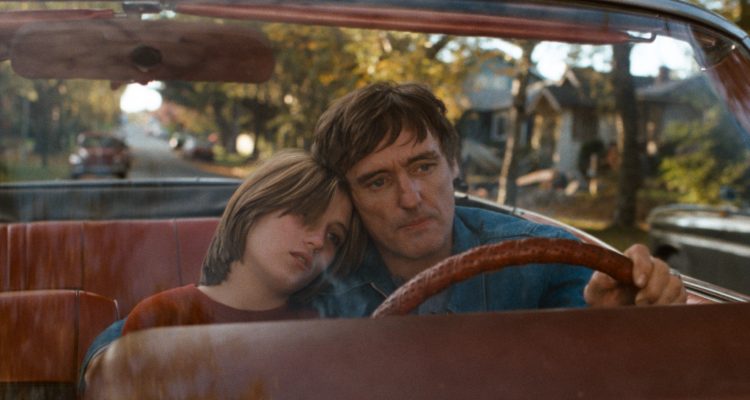Some movies feel timely, and some feel timeless; then, there are the movies that make you feel as if the auteur behind the wheel must have stepped out of a time machine to make it. Dennis Hopper’s long-unavailable “Out of the Blue” – which premiered 40 years ago at the Cannes film festival – would be hailed as a flat-out masterpiece were it released in 2020. A spiritual successor to 1969’s seminal “Easy Rider,” Hopper’s 3rd directorial effort is a work that transmogrifies itself so deftly it somehow sways between pensive and punk. It’s a movie that can feel like several you’ve seen before, yet never distorted in quite this style, beat, or fashion. When the messy trajectory seems as though it might be on its way to the point of reflection, dissension re-ignites, and counter-cultural discord combusts through expressive punctuation, once again.
Despite “Easy Rider’s” profound Hollywood success, Hopper’s bat-shit ambitious follow-up, aptly titled “The Last Movie,” was not exactly well-received, resulting in him going into directorial exile for the next decade. While working as an actor on a Canadian project, then titled “CeBe,” producers grew so frustrated over the effort that they axed the original filmmaker behind the movie. After re-writing the script over the next weekend, catering the material to the abilities and presence of actor Linda Manz, Hopper took over directing duties on Monday.
Shelved for two years following the European premiere, “Out of the Blue” is the kind of film that would remain largely unseen without a select few who found themselves enamored with it (such as actor Sean Penn, who pushed for Hopper to direct his film, “Colors,” after being so taken with the picture) – a comparison one could make, a band like “The Velvet Underground.” Everyone who has seen it, knows how special it is. Every one, who’s bound to discover it later, soon will.
Beginning with an opening that calls back “Easy Rider’s” conclusory shock to the system, we are introduced to Cebe Barnes (Manz) and her father, Don (Hopper). She’s done up in clown make-up, and he’s wearing a cowboy hat, at the wheel of a huge semi, roughhousing with his daughter – eyes more concerned over hips lips meeting the bottle than watching the road. Tragedy strikes. We think? At the moment of impact, Cebe wakes up from a nightmare, her bedroom walls plastered with photos of her messiah and icon: the King of Rock N’ Roll himself, Elvis Pressley. She’s a rebel with a cause: live the life of a punk rocker, like Sid Vicious or Johnny Rotten. In other words, all her heroes are junkies.
“Subvert normality,” is one of Cebe’s favorite sayings, as it seems everyone in town looks and whispers about her in a certain way, and, more so when her mother is around. We learn part of why when people continue to mention that Don will be getting out of prison soon. After a territorial-seeming lug named Charlie (Don Gordon) creepily lingers over Cebe’s shoulder at a bowling alley, he strong-arms her mother, Kathy (Sharon Farrell), chastising her for not wearing a wedding ring and being out in public with another man, Dr. Brean (Raymond Burr), who runs the diner she works at. Charlie shows up at the Barnes’ residence later with needles for her mom to shoot up with. Cebe runs away. After a long night of close-calls and underground club hysterics, she gets arrested for driving a stolen car.
When Cebe’s father gets out of prison, it seems like the two may be able to find mutual strength in their relationship. Still, Don’s thankless job at a landfill soon goes sour, as the town’s distaste for him, and the actions he’s committed, continue surfacing in more and more troubling ways. As Hopper’s “Out of The Blue” transmorphs itself, it revitalizes what the central narrative seems to be a few times over; one minute it feels as if you’re watching the meeting point between “The 400 Blows” and “Sid and Nancy,” another like it’s a punk-rock “Mikey and Nicky” with a hint of the paternal sentimentality of “Paris, Texas,” and then, “Out of the Blue’s” ending explodes, recontextualizing everything that’s come before. Once the credits start rolling, you realize the musical rebellion Hopper housed at the center of his picture is so much more than simply an artistic gesture; it’s a grand statement on unspoken abuse wrecking the harmony of life and liberty.
Sadly passing away this past August, Linda Manz is probably best known for Terrence Malick’s “Days of Heaven.” She was not originally meant to be a narrator of that film, nor was “Out of the Blue” meant to be about a punk girl wrestling with neglect and survivor’s guilt. Hopefully, now that the film has been remastered/re-released, more will come to know Manz for her tremendous performance in Hopper’s movie. It’s one for the ages (as is Hopper’s), the movie being one of the most devastatingly convincing, father-daughter tragedies ever brought to life by a motion picture – a decided look on what leads to deplorable and/or delinquent behavior tearing families apart, a musing yet incensed examination of where American aggression truly comes from. [A]
You can watch the original trailer here:
You can watch the new restoration trailer here.

